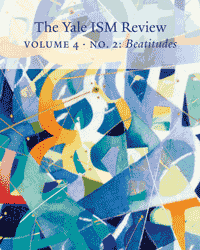Our issue on the Beatitudes begins with two articles that consider the Beatitudes as a whole. Peter Hawkins surveys Dante’s brilliant vision of the Beatitudes from the Mountain of Purgatory, and Christopher Irvine explores the embodied reality of blessedness through a reflection on Antony Gormley’s works of sculpture.
In the second section of this issue, our contributors draw attention to each of the Beatitudes, one by one. Cathy George reflects on poverty of spirit and the faith of children, drawing on her experiences of their prayers in the children’s Liturgy of the Word. Swee Hong Lim then takes us to the Global South to show that we have much to learn from believers who create sacred music in some of the poorest parts of the world.
In reflecting on “blessed are they who mourn,” Tom Long invites us into a deeper appreciation of the difference between grief and mourning, and gives us a profound context for understanding the Christian funeral. Teresa Berger then describes a new practice of creating a space for mourning, which turns our attention to contemporary experiences of displacement known to migrants and refugees.
Michelle Lewis asks how blessings of animals and the cultivation of community gardens can help to put us in touch with the meekness of nature itself and thus enable us to share more deeply in the inheritance of the earth that God promises.
To help us better understand the beatitude “blessed are they who hunger and thirst for justice,” we have reprinted a seminal address on “Preaching the Just Word” by the eminent scholar and preacher, Walter J. Burghardt, SJ (d. 2008). He later developed this theme for the Beecher Lectures at Yale Divinity School. Those lectures were subsequently expanded into a book, published by Yale University Press. It is worth noting that “Preaching the Just Word” also became the title of a series of seminars which he conducted across the United States for more than twenty years. It all started with this text, which we share with the kind permission of the Maryland Province of the Society of Jesus.
Next, Paul Inwood recounts his extraordinary experience of composing the hymn for the Year of Mercy in 2015. Be sure not only to read this fascinating account, but also to note the video recordings (one in Slovak, and one in Arabic) which show the hymn being performed variously in different parts of the world.
Purity of heart is an essential theme in the story told by Hyuk Seonwoo, whose Korean Methodist congregation has come to treasure the celebration of weekly Communion. Read “Sacramental Jars of Clay” to see how the celebration of Eucharist has invited personal transformation and supported this community’s sense of mission.
The work of transformation is also important to Benjamin Bergey’s essay on building peace through music. Conflict transformation, an outcome of the patient work of building peace at the grassroots level, can be fostered in concrete ways through music. The author shows us how.
Cheryl Cornish’s essay on “blessed are those who are persecuted for the sake of righteousness” does not let us off the hook of ambiguity in assessing the difference between righteousness and self-righteous behavior. The key—revealed poignantly at a moment in worship—is the cross.
Our closing feature, “One Final Note,” is an extract from a book-length poem entitled Beatitudes. This work has been called “a postmodern Sermon on the Mount.” In it, the Canadian poet, Herménégilde Chiasson, describes a longing for heaven in a wide range of everyday moments—interwoven with aches, doubts, tedium, and hope. Both a cry and a prayer, Beatitudes is an unfinished litany.
Rita Ferrone, editor
November 28, 2018
